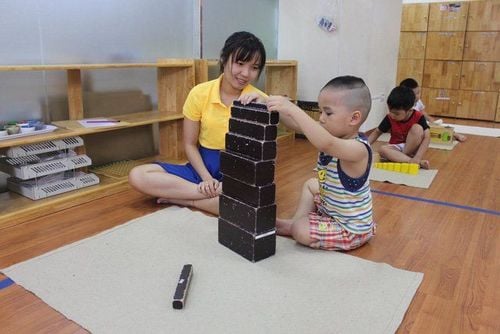This is an automatically translated article.
A few simple tips below can help parents prevent bad behavior in children from an early age.
1. Limit setting
In order for children to know what to do and what not to do, you need to set limits. For example, when a child asks to eat unhealthy and unhealthy foods, you can have two ways to respond to the child by saying, “You can eat or you will be allowed to eat, but not ask for more. anything else”.
You satisfied your child with your first answer and he will continue to ask for more when he wants. However, in the second answer, you explicitly set the limit for the child so that he understands that he will not accept another request.
Timeouts can be effective discipline for toddlers. For example, if a child has hit, bitten or thrown food, the child needs to be told why the behavior is unacceptable and you should take the child to a designated waiting area for a minute or two so that the child can calm down (longer timeouts don't work for toddlers).
It's important not to spank or slap children of any age. It is especially difficult for babies and toddlers to make any connection between their behavior and physical punishment. Children will only feel pain when hit.
And don't forget that children learn by watching adults, especially parents. You need to be a role model for your children. You'll make a much stronger impression by putting your own things away instead of just ordering your kids to pack up their toys while your stuff is thrown around.
2. Teach your child to understand and agree to your limits

Không nên để trẻ ăn vặt thường xuyên hãy dạy cho trẻ hiểu và đồng ý với giới hạn bạn đưa ra
A snack may not cause immediate harm to your baby, but you can't predict if your child will like it and eat it for a long time. This is not good for your child's health, and can even cause some problems beyond your control.
It is actually quite difficult for children to accept the fact that they only get to eat it a few times, not often. Children may express anger, sulk, and even scream, but it will pass quickly when the child forgets. The most important thing you need to do is not to compromise with the child's unreasonable demands because the child is too young to understand what could be harmful to the child's health.
If your child continues the bad behavior no matter what you do, try setting up a chart for each day of the week. It is up to you to decide how many times your child can misbehave before being punished. Stick the chart on the fridge so kids can keep track of what's going on. As your child begins to become aware of his actions, praise him or her for learning to control bad behavior.
3. What to do when the child abuses?
Children will abuse by crying, begging, rolling on the floor, even screaming when demands are not met, in this situation you need to firmly say "No". You need to stay clear, even if your child may continue to cry and get angry, and not waver no matter what he does. Children will gradually give up this bad habit after a few times because they know that bullying will not bring any benefits.

Trẻ khóc lóc ăn vạ đòi hỏi gì đó bạn nên nhất quyết nói không để trẻ dần tự bỏ thói quen xấu
4. What are the things children want to have that are really good for them?
If in case you are not sure what the baby wants is really good for him or not? Ask your child why he wants you to do this. You will be more comfortable and agree to what your baby wants when you get a good reason.
5. Give your child work to do
Giving your baby chores is a simple way to teach them the first lessons of responsibility. Your child can help you with small tasks such as putting dirty clothes in a basket, getting dry clothes... Thank and reward your child with a small gift to boost their work ethic and say that they helped you. a lot of work.
6. Let your baby get used to disappointment

Những lúc trẻ cảm thấy buồn, thất vọng hãy luyện tập cho trẻ các kỹ năng đối phó với nỗi buồn và sự thất vọng trong cuộc sống
Although they don't want to, in this life, it is inevitable that there will be times when children feel sad, disappointed or even hopeless. Instead of trying to comfort your child, you need to practice skills to deal with sadness and disappointment in life. This is of immense value as the child matures.
7. Help children understand the value of labor
The fastest way to spoil a child is to easily buy them the things they love. You need to express clearly and unequivocally that the child must be able to do good and useful work in order to receive a worthy reward.
When your child wants a toy, you can give him a task, such as putting all the toys in the basket, or putting your own things in the closet... After finishing the work, Children will receive a worthy reward, eventually they will realize that success comes from their own efforts and efforts.
Article referenced source: Babycenter.com













